- Home
- Susan Hill
Old Haunts Page 2
Old Haunts Read online
Page 2
Our unit. Simon was in the dark.
‘You weren’t expecting any of this, I know, and you’re at liberty to refuse to take part – technically anyway. You want fast track into CID, I gather.’
‘I’m hoping, yes, guv.’
‘No need for that – it’s John. Later, I’ll have a code name, as will Nick. As will you. This is a good start, Simon – depending on how you shape up, the fast track might get a bit faster. Not my call though. You’re wondering what the hell this is all about.’
‘Pretty much. But undercover, that’s obvious.’
‘You’ve just attended a briefing about the hoaxes and been filled in on a lot more so tell me as much as you can about the IRA’s mainland bombing campaign and then what you know about splinter groups. Start anywhere.’
He regurgitated the information accurately.
‘Do you want details of the game we played?’
‘No. I’m sure you know that none of this is a game.’
‘That goes without saying.’
‘I hope so. You live with your sister, who’s a doctor?’
He was taken aback by the sudden change of gear. ‘Not quite. We were both medical students, at the same hospital – she still is one.’
What else did they know? It was not a secret that he and Cat shared a flat. But he wondered what else they knew. Cat had met someone she was apparently serious about so the chances were she would not be wanting her brother around for much longer. He had not given any thought to what would come next for him.
‘And for a while you both lived in Jubilee House?’
‘Yes.’
He felt even more uncomfortable.
‘Tell me about that.’
‘What, the friend?’
John shook his head. ‘The flats.’
Simon just stopped himself from asking why he would bother, given that they seemed to know everything about where he had lived, and the rest. He guessed they would not appreciate the remark.
‘Delville Way. I suppose the flats were considered quite desirable, once upon a time. There are three blocks – Victoria House, Coronation House and Jubilee House. They’re pretty solid – but not well maintained now. They’re scheduled for demolition at some point – that whole area is due to be redeveloped. May I ask why all this is of interest?’
‘As you imply, these old blocks have gone down in the world and whoever owns them is just waiting to pocket the money from the developers. In ten years’ time you’ll be looking at a very smartened-up area of London.’
‘I won’t be able to afford to live there again.’
‘But for now, Delville is still pretty down at heel. It’s a haven for lowlife, drug dealers and petty criminals – and a few elderly tenants who’ve been there forever.’
‘To be fair, that isn’t the whole story and it never was. Delville Way is within reach of two big teaching hospitals. Plenty of med students live there, and some junior doctors.’
‘You sound quite fond of it.’
‘I was. I like living among real people.’
‘How well do you remember the place? Your block?’
‘Jubilee?’
‘Yes.’
‘Very well.’
‘Are all three blocks identical inside as well as out?’
‘I never went into Victoria but the other two are – a couple of friends lived in Coronation House and we could have exchanged flats pretty much without noticing the difference.’
‘What floor were you on?’
‘G. Number 22.’
‘Which is next to …’
‘G24. 20 on the other side.’
‘Is G22 at the end of a corridor?’
‘No. One away. So it’s 20, 22, and 24 is at the end.’
‘And going the other way?’
‘That corridor starts at 10.’
The room got hotter as the sun moved so that now it shone directly onto them. The other two were relaxed, leaning back easily in their chairs, in no apparent hurry and not noticing the heat. Which was as well, as the windows could not be opened and there were no blinds.
They were silent for a time. Whatever this was about, Simon knew better than to show any sign of impatience, even just to escape outside into what passed for fresh air. He sat with one leg over the other, arms folded. John’s face was without expression, neither friendly nor hostile. Nothing. Nick the same. It was as though they had learned to make their faces blank at will.
‘No questions then?’
‘Obviously I have. But maybe you’re going to answer them before I need to ask.’
‘Maybe. We’re in here for several reasons – the first being, we need someone who has a close knowledge of the blocks – as you say, the layout of them all is exactly the same. The one you lived in was Jubilee but this time you’ll be in Victoria.’
‘In?’
‘Living in.’
‘When?’
He did not answer the question directly. ‘Level G, Flat 22 – exactly the same numbers are used in all three blocks, which must drive the postmen mad, but it means your flat will be the identikit one to the flat you had before. Next door is 24, at the end of the corridor. It’s 24 we’re interested in. Two blokes took it a couple of weeks ago and a third is a regular visitor. We’ve been keeping an eye on them.’
‘Can I ask why?’
‘Ask anything – though you may not get an answer. I can tell you a bit. We have info that these two in the flat, and probably the third who visits, are involved – we don’t know to what extent – in planning something – we don’t know what – in London, in the future – and we don’t know when, or if that’s the near or the further future.’
‘Do we know their names?’
Nick, who had said nothing so far, glanced at his partner before saying, ‘Interesting you say “we”.’
Simon had no useful reply.
‘You’ll not need their names – and they’ll be false ones anyway. Your name will be different too and we’ll be giving you a legend – you know what that is?’
‘Backstory – which will be invented.’
‘You’ll move in this coming Saturday. A removal guy will contact you. He’ll have a van full of stuff, all you’ll need for 22 Victoria House.’
‘What about my own stuff?’
‘You won’t be taking anything, except for underwear and personal bits. Clothing to fit will be provided. You won’t have a telephone there, but you will have a pager, on which you will be contacted.’
‘Can you give me any idea of what I’m going to be doing there? Surveillance?’
‘Partly. Otherwise, it’s some DIY.’
‘I see.’
‘No, you don’t, not yet.’
‘So … why me? Just because I lived around there for a few months?’
‘Partly.’
Without warning, John glanced at Nick, and they both stood up.
‘That’s it for now. Someone else will be in touch.’
‘How? Like this?’
‘Possibly.’
They stood for a minute in silence, a minute which Serrailler found uncomfortable. He had no idea whether he was obliged to do this – whatever it was – or if he had a choice. He was puzzled and faintly alarmed. He was also excited.
At the door, it was Nick who spoke. ‘Thank you, Simon,’ he said. ‘You come recommended.’
‘I’ve been in the force less than two years.’
Nick shrugged.
‘And I’m uniform. Why haven’t you gone to CID?’
‘Good reasons,’ John said.
And they melted away down the corridor.
Nothing happened straight away. He did his Tuesday, Wednesday and Thursday shifts, 10–2; Friday was changeover day, and he was off at the weekend. The following week was the same. But on the Friday, he got a message to see the roster sergeant.
‘You’re signed off till today week, Serrailler.’
‘No, Sarge. Sunday I go onto lates.’
&
nbsp; ‘I repeat. You’re signed off till today week. Says here. Report back Friday 17th. Off you toddle.’
‘What –’
‘Why, who, what, where? Don’t ask me, sunshine.’
It was like another game, one with half the board cut off and a lot of pieces missing. No one had told him the rules or even what the aim was supposed to be. He went out into the sunshine feeling annoyed, and made for a pub two streets away, which had tables on the pavement. The previous week, he had met up with Nina Blake again – drinks, dinner in a small, pleasant Italian family restaurant, a walk home. But Cat had been in, after a day of ward rounds following a demanding cardiothoracic surgeon, then lectures in anatomy and a spell in the labs. She had made it clear that she was about to embark on as long a sleep as she could possibly get and that she would not appreciate her brother bringing a girl back for the night.
Today, though, Cat was away on a reading week. Simon got change for the phone but Nina did not answer.
When he had bought a pint and taken it outside, a man was sitting at his table – which wasn’t ‘his’ of course, but in his present mood, every small annoyance felt like a slight.
He could take a seat at the end of the terrace – one that was in the shade and on the kerbside. His only other option was to go back to the bar.
But as he hesitated, the man at ‘his table’ turned his head in Simon’s direction and nodded very slightly, to indicate the other chair. Simon wasn’t in a companionable mood. He wanted to drink his beer quietly in the sun.
The man caught his eye and something clicked in Serrailler’s brain. He went over and put his pint on the table. There were only the two chairs. No one else could join them and he saw that the table had also been pulled a few feet away from the one next to it.
He had unmemorable features, wore a denim jacket, white shirt, no tie, chinos. Thirty-five? Maybe a bit less or a bit more. He was drinking a beer, and watching the world go by on the other side of the street. But after Simon sat down, the man then ignored him.
Ten minutes. Fifteen. He was about to go and get a second pint but instead he said, ‘Nice evening.’
The man gave him a blank look. His attention, his thoughts, even in a strange way his body, seemed to be elsewhere.
He said nothing.
Sod this.
He wouldn’t bother with the second drink. Not here anyway. Whatever his instinct told him, it had been wrong. He got up and walked away, towards the Tube station. He was at the ticket barrier when he felt a slight nudge as someone pushed by him, but then walked on quickly towards the escalators.
It was only when he got onto the train that Simon realised his jacket pocket, which had been empty, now contained something about the size of a cigarette packet, square, not heavy.
Five stops and he was off the Tube, but he did not touch his pocket again, until he had sprinted the half-mile from the station and was back home.
He found a reinforced envelope in his pocket, inside which was a small cardboard box. Inside the box was what he thought was a pager. No note, instructions, or batteries. Just the pager.
He packed it up again and slipped it into the rucksack containing his gym kit. He rarely got to the gym, but he walked enough on the beat every day and went for long runs along the Embankment when he was off duty.
In the kitchen were eggs, cheese, pasta, tomatoes, a tub of olives – plenty to make a scratch supper. The doorbell rang.
‘Delivery for Guthrie.’ Tall, in motorcycling gear, with a helmet which he did not remove. When he had handed over an envelope, he was off down the stairs before Simon had a chance to say that he was not called Guthrie.
The envelope contained six AAA batteries, basic instructions on how to use the pager, and a card on which was typed a line of what looked like code. Also:
Gwyn. 444. Emergency only. Do not leave the flat for any reason.
He went back to the kitchen, made supper and ate it. Waited. But nothing else happened for the rest of the evening, and just after midnight he went to bed.
He was wakened early by a banging at the door. The postman handed him two letters for Cat and one registered envelope addressed in type to ‘Mr J. Guthrie’ which he had to sign for. He hesitated but the postman was flipping through the rest of his delivery pile and did not notice that he almost began his signature with ‘S’ before changing quickly to a scribble that half resembled J. Guthrie.
The pager beeped. ‘Steve’s SwiftMoves. BD39 SMR. 7.45 a.m. Oak. Do not leave forwarding address.’
He was up and ready by quarter to seven, a small holdall packed with personal stuff, already getting used to instructions coming bite-sized and apparently at random. Trust, he thought. That was what it amounted to and it was coming to him. The operation bore plenty of resemblance to the cloak-and-dagger stuff wishful small boys believed in and the small boy in Serrailler felt a twinge in his gut. John and Nick had not only failed to stress danger – Simon didn’t think the word had even been spoken – or ‘risk’ or ‘Secret’, but somehow all of them had been implied throughout the briefing in Interview Room 19.
He wondered if he should go down to wait for the removals van or stay here. 7.44 and the pager buzzed.
‘Hapsley Street.’
It ran along the side of the block.
Steve’s SwiftMoves. The van was dirty, barely within the range of acceptable. Simon walked round it.
‘Also available in WHITE’ was fingered on the doors.
Youngish man. Three-day growth of beard. Open-necked check shirt. Smoking. But the driver’s look, as Serrailler stopped, was brief and intense. He didn’t know whether to speak or not.
‘Sycamore?’
His mind floundered. Then, apparently of its own accord, produced ‘Oak’.
The man leaned over and unlocked the passenger door.
‘Steve?’
Only a nod of the head, indicating that he should get in.
Serrailler waited to see if the man, who was probably not called Steve and might not even be a cop, would start talking, before he himself said anything at all, let alone asked any questions.
After a couple of miles through traffic-clotted streets, he said only, ‘There’s nothing too heavy, we can do it in three trips up. No lift.’
‘You’ve been there?’
Another brief nod.
‘You know what this is all about?’
No nod, no shake of the head.
It was rush hour and what might have taken twenty minutes cost them well over an hour, much of it at a standstill or crawling. The inside of the van was anonymous, but if they had been stopped for any reason, it would have passed as ‘Small removals’ without questions. Chewing-gum packets in the well. School photo of two kids, boy and girl, in uniform, big grins, the boy missing two front teeth. Sticker with a couple of phone numbers and dates scrawled on. Two-days-old copy of the Sun stuffed into the side pocket, along with some loose sherbet lemons and biros.
He could not see what was in the back, which was separated from the driver’s compartment.
When they turned into the estate and the three old blocks came into view, Serrailler had an odd moment of confusion. He had lived here, he had been a medical student, he had cycled to the hospital through the sort of traffic they had just endured. It felt like yesterday. But he was back here now as – as what? Some sort of temporary plain-clothes cop? A cop anyway. Undercover. Sort of. Not the same man he had been when he had studied anatomy, physiology, vital signs, done his first ward rounds in a white coat, felt awkward standing in a group beside some ill stranger’s bed, asking questions about them as if they were deaf or even not actually there. Embarrassed for the man or woman in a dressing gown, in pain, in discomfort, in fear but uncomplaining. Resigned. Always resigned.
Which man was he?
Steve, which was presumably what he would have to call him, had jumped out and was opening the back doors of the van.
VICTORIA HOUSE
He could have been back in J
ubilee. It was the same in every detail. Déjà vu. The ‘furniture’ that came out of the van was a scruffy, ill-matching assortment. Kitchen table, two lamps, wicker armchair, cushions, old-style TV, kettle, toaster, fridge, bar stool, boxes of bedding, carton of books, box of cutlery, mirror. Exercise bike. Bedside chest with two handles missing. Four trips. Steve had produced a key, and handed it to Serrailler as he was leaving, along with an A4 envelope.
They met a woman with a toddler and pushchair and an older woman with a shopping bag. Neither spoke. Both went on up to other floors.
‘Thanks,’ Simon called after Steve.
‘Cheers.’
Then quiet. He went inside and closed the door, then opened it again, and after a moment, moved along to the door of 24. No sound. He waited for five minutes by his pager. Nothing.
The flat was identical to the one he had lived in. Small rooms, boxes stuck together sideways. Living-room window looked onto the side of the next-door block and the patch of scrubby green grass between them. Beyond, the sprawl of outer London. A dirty sky. Kitchenette. Bedroom. Bathroom. Postage-stamp hall. He unpacked his own stuff, left the rest. He’d make up the bed later. He plugged in the fridge and switched it on. The elderly electric cooker needed cleaning.
He stood looking out of the window. Made tea. Sat in the wicker chair whose seat sagged beneath him.
He felt disorientated and faintly depressed. Bored. Dispirited.
The pager did not buzz. No one came. He had put the envelope Steve had handed to him on the side table. Now he looked at it. Supposed he ought to open it and get whatever were his next instructions.
The sun came out and shone onto the faded brown-and-yellow carpet. He fell asleep.
A man was standing a few feet away from him across the room and Serrailler did not know where he was, only knew, as he came fuzzily awake, that no man should be there.
‘Morning.’
He shot out of the chair. ‘Who the hell are you? How did you get in here?’
Another anonymous-looking bloke, average shape, size and colouring. He held up a key.
‘OK, but who are you? I wasn’t told –’
‘No. I need to know if anyone’s in the next-door flat – 24. Only you being asleep makes that a bit of a non-question.’

 Mrs De Winter
Mrs De Winter A Question of Identity
A Question of Identity The Various Haunts of Men
The Various Haunts of Men The Pure in Heart
The Pure in Heart Printer's Devil Court
Printer's Devil Court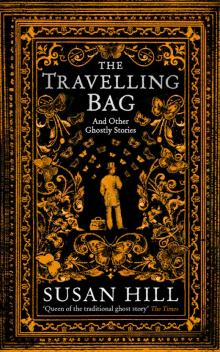 The Travelling Bag
The Travelling Bag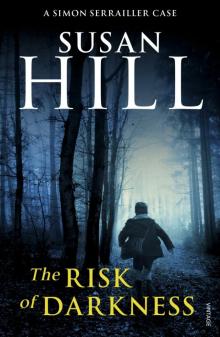 The Risk of Darkness
The Risk of Darkness A Kind Man
A Kind Man Black Sheep
Black Sheep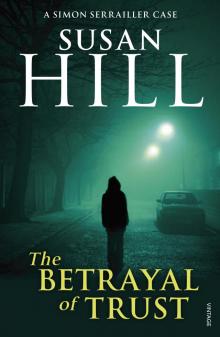 The Betrayal of Trust
The Betrayal of Trust The Service of Clouds
The Service of Clouds Betrayal of Trust
Betrayal of Trust The Small Hand
The Small Hand Dolly
Dolly Jacob's Room Is Full of Books: A Year of Reading
Jacob's Room Is Full of Books: A Year of Reading The Vows of Silence
The Vows of Silence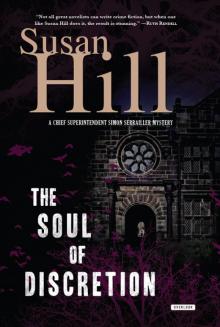 The Soul of Discretion
The Soul of Discretion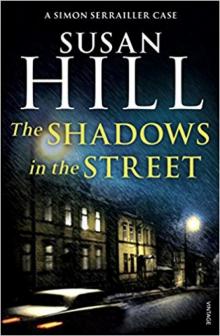 The Shadows in the Street
The Shadows in the Street The Man in the Picture
The Man in the Picture Air and Angels
Air and Angels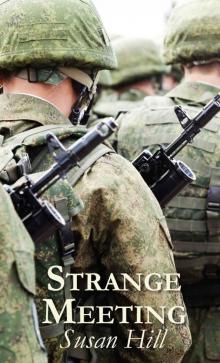 Strange Meeting
Strange Meeting In the Springtime of the Year
In the Springtime of the Year Howards End Is on the Landing: A Year of Reading From Home
Howards End Is on the Landing: A Year of Reading From Home From the Heart
From the Heart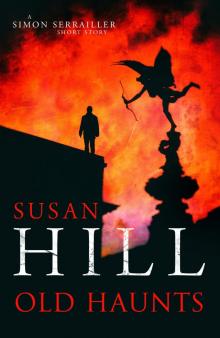 Old Haunts
Old Haunts The Mist in the Mirror
The Mist in the Mirror The Woman in Black: A Ghost Story
The Woman in Black: A Ghost Story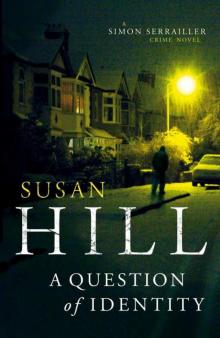 A Question of Identity (Simon Serrailler 7)
A Question of Identity (Simon Serrailler 7)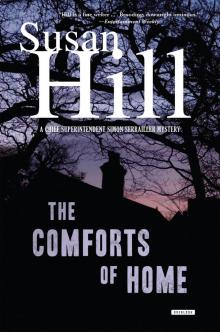 The Comforts of Home
The Comforts of Home Mist in the Mirror
Mist in the Mirror Jacob's Room is Full of Books
Jacob's Room is Full of Books The Woman in Black
The Woman in Black Howards End is on the Landing
Howards End is on the Landing